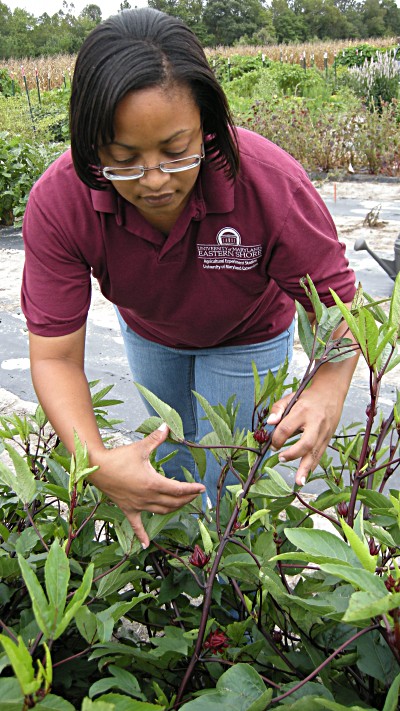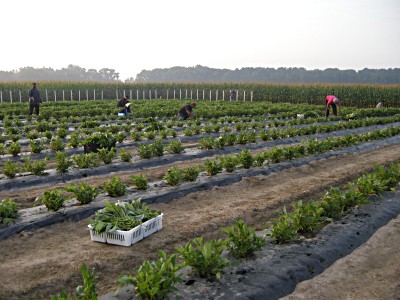
PRINCESS ANNE, MD- (August 17, 2020)- A three-year $600,000 USDA grant awarded to the University of Maryland Eastern Shore seeks to expand and strengthen food science research, teaching and extension related to ethnic crops to meet the growing demand on the Delmarva Peninsula.
“The increased demand for locally grown food provides opportunities for small farmers to grow crops to serve the increasing local ethnic markets,” said Corrie Cotton, a research assistant professor in the Department of Agriculture, Food and Resource Sciences and principal investigator for the grant.
“Providing small farmers with research-based production practices and introducing them to potential value-added product markets will provide them with new ways to produce income through alternative enterprises and improve their productivity,” Cotton said.
Sustainable fertilizers, biostimulants and beneficial microorganisms will be studied in field experiments to improve soil health, yield and the quality of ethnic crops such as purslane and edamame. Research will also be conducted on pre- and post-harvest pest management and health-beneficial phytochemicals and their antioxidant capacities.
The value-added portion of the project builds on a previous ethnic crop study (Capacity Building Grant Program, Project No. MDX-PS201401). Fresh, frozen, dried and other products will be developed for hibiscus and amaranth. To develop value-added products from amaranth, the effect of processing methods such as steam blanching, canning and freezing will be investigated in addition to packaging and storage. For hibiscus, the combination of processing steps that promise greater retention of color, aroma and other sensory attributes will be studied.
“Hibiscus calyces will be dried naturally or freeze-dried and either milled for incorporation into other wellness foods or extracted with hot water, pasteurized and bottled as a health-promoting beverage,” Cotton said.
As part of the grant, new courses will be developed at UMES in food science, food processing and preservation, and value-added product development of ethnic crops. Undergraduate and graduate student researchers will also gain valuable hands-on learning opportunities in agronomic production and food science assisting with fieldwork, plot management and data collection within UMES’ Agricultural Experiment Station.

On the Extension side, Cotton said, training workshops will be held for small farmers on sustainable production practices, pest management, value-added product development, packaging and marketing. Research outcomes will also be shared through on-farm demonstrations and tours.
“Farmers who are serious about growing ethnic crops will be provided with seeds or seedlings and given technical assistance during their first growing season,” Cotton said. Assistance will also be offered to farmers who want to apply for value-added producer grants through USDA Rural Development or other grant programs.
For more information, contact Cotton at cpcotton@umes.edu. This research is funded by the USDA/National Institute of Food and Agriculture Capacity Building Grant Program, Project No. MDX-PS202004a.
Gail Stephens, agricultural communications and media associate, School of Agricultural & Natural Sciences, University of Maryland Eastern Shore, 410-621-3850, gcstephens@umes.edu.

